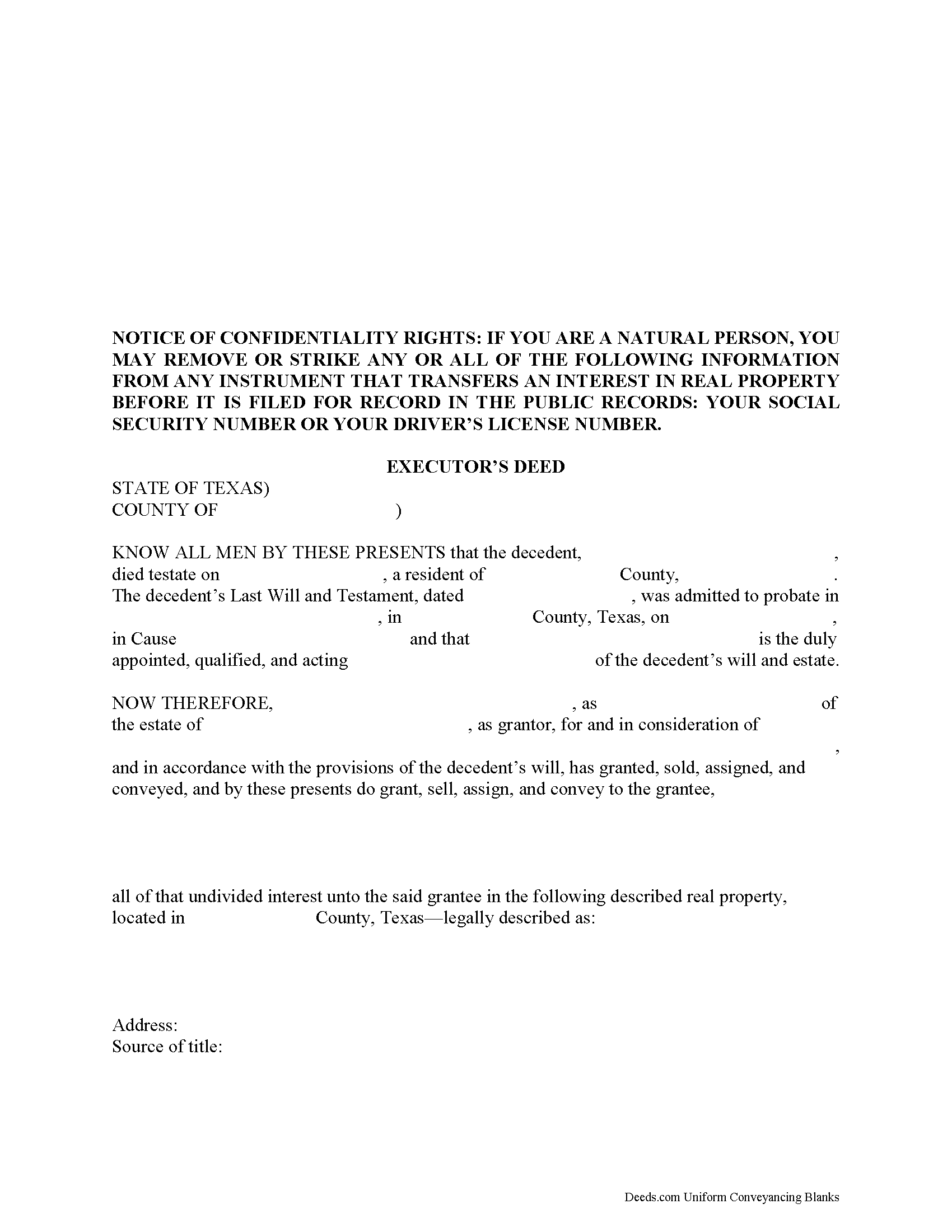Texas Executor Deed
County Specific Legal Forms Validated as Recently as August 7, 2025

About the Texas Executor Deed

How to Use This Form
- Select your county from the list on the left
- Download the county-specific form
- Fill in the required information
- Have the document notarized if required
- Record with your county recorder's office
What Others Like You Are Saying
“Extremely helpful -- logically presented -- great documentation...”
— DAVID G.“So far GOOD, just can't locate legal description. Will sign in later when have correct info. Thanx!!…”
— Roger W H.“Very easy to sign up. Very quick to respond for payment once uploaded. Great communication. More exp…”
— Byron M.“This website is very user friendly. I easily found the form I needed and was given an example for fi…”
— Patsy B.“So far So Good. Ill come back and re review after it is all finished. I have downloaded all the docu…”
— Phyllis C.
The Texas Statutes cover the rules for selling a decedent's property from a probate estate in Chapter 356 of the Estates Code.
When a will is admitted to probate, the court officer authorizes an executor to manage, and eventually close, the estate. Among other duties, this involves identifying the assets and liabilities, paying the bills, and distributing property according to the terms specified in the will.
Many estates contain real property. Depending on the circumstances, the executor might transfer the title to heirs as directed in the decedent's will or sell the property outright. In any case, the executor must issue a deed for the transfer. Note that executor's deeds do NOT typically include a general warranty on the title. The executor may offer a special warranty, meaning that he has the right to sell the property, and will only defend the title against claims on his actions.
An executor's deed is used by executors who are authorized by the Probate Court to transfer real property out of an estate. These instruments must meet the same requirements as a warranty deed or quitclaim deed, plus include additional information about the probate case. Sometimes, the executor must also include supporting documentation such as copies of the letters testamentary, the will, signatures from heirs or beneficiaries, etc.
Settling probate estates can be complicated, so take the time to understand the issues. Before buying or selling real property from an estate, review all the risks and benefits, and contact an attorney with questions.
(Texas Executor Deed Package includes form, guidelines, and completed example)
Important: County-Specific Forms
Our executor deed forms are specifically formatted for each county in Texas.
After selecting your county, you'll receive forms that meet all local recording requirements, ensuring your documents will be accepted without delays or rejection fees.
How to Use This Form
- Select your county from the list above
- Download the county-specific form
- Fill in the required information
- Have the document notarized if required
- Record with your county recorder's office
What Others Like You Are Saying
“Extremely helpful -- logically presented -- great documentation...”
— DAVID G.“So far GOOD, just can't locate legal description. Will sign in later when have correct info. Thanx!!…”
— Roger W H.“Very easy to sign up. Very quick to respond for payment once uploaded. Great communication. More exp…”
— Byron M.“This website is very user friendly. I easily found the form I needed and was given an example for fi…”
— Patsy B.“So far So Good. Ill come back and re review after it is all finished. I have downloaded all the docu…”
— Phyllis C.Common Uses for Executor Deed
- Transfer property between family members
- Add or remove names from property titles
- Transfer property into or out of trusts
- Correct errors in previously recorded deeds
- Gift property to others